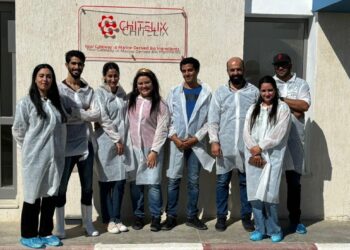Krill in feed: the sustainable breakthrough for aquaculture – In the delicate balance between nutrition, sustainability and production performance, European aquaculture is looking with growing interest at new protein sources for feed. A scientific review by researchers Kiranpreet Kaur and Silvia Torrecillas highlights how the inclusion of krill in aquaculture feed represents a promising solution, particularly for non-salmonid species such as sea bream, sea bass, sea bream and tilapia.
In a global context where the availability of fishmeal and fish oil is threatened by climatic and economic factors — just think of the collapse in production in Peru linked to El Niño — products derived from Antarctic krill (Euphausia superba) stand out for their nutritional profile, palatability and sustainability. High-quality proteins, phospholipids rich in EPA and DHA, astaxanthin and bioactive peptides combine in a functional ingredient capable of stimulating growth, strengthening the immune system and improving fillet quality.
According to the review, the inclusion of krill in percentages ranging from 3% to 9% in the diets of sea bass, sea bream and flounder showed a significant improvement in feed conversion ratio (FCR), feed intake and nutrient digestibility. Even under stressful environmental conditions, such as overcrowding or reduced fishmeal content, the inclusion of krill ensured results comparable to — if not superior to — conventional feeds.
A particularly significant result concerns fillet quality: maintaining the omega-3 content in the tissue and the antioxidant contribution of astaxanthin improve the nutritional profile and shelf life of the final product.
From an environmental point of view, krill fishing is strictly regulated by the Commission for the Conservation of Antarctic Marine Living Resources (CCAMLR), with precautionary catch limits and prohibited areas. 75% of krill caught in 2021 was certified according to the MSC standard, confirming the consistency of this ingredient with internationally recognised sustainability criteria.
However, one issue remains unresolved: cost. Krill-based products, while offering excellent nutritional and functional performance, are still more expensive than vegetable meals or fish by-products. For this reason, Kaur and Torrecillas stress the urgency of further economic studies: only a comprehensive cost-benefit assessment can accurately guide the choices of formulators, especially for products intended for high-end markets or value-added labels.
In the context of an increasingly strategic transition towards circular, traceable and effective formulations, krill is set to become a credible ally for the Mediterranean aquaculture industry. Its characteristics make it suitable for use in combination with other emerging proteins and, when dosed correctly, it can help to strengthen the profitability and quality of products without compromising sustainability. This is a concrete prospect for those who formulate, produce and market fish products of the future.
Those involved in fish nutrition, production or processing should begin to evaluate the potential of krill more carefully. In an era where every choice in the food chain makes a difference, even the smallest detail can become strategic.
Krill in feed: the sustainable breakthrough for aquaculture







